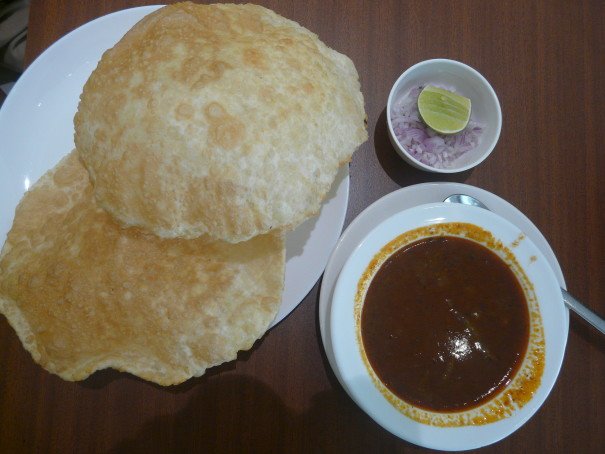
The Unlikely Origin Story of a Breakfast Paradise

The Unlikely Origin Story of a Breakfast Paradise
Chole Bhature in Mumbai
Our Sunday mornings were once defined by three Cs: church, community, and chole.
Growing up, every Sunday after Mass and all its associated rituals had concluded, our family piled into our spacious, white Ambassador car and headed to an unremarkable Sindhi restaurant in Chembur Camp. This was a former army barracks used to resettle refugees after India’s Partition in 1947, which was now a residential area. We joined other zealous devotees for plates of steaming hot ragda pattice (a potato patty dunked in a tangy pea gravy and served with an assortment of sweet and spicy chutneys) and chole bhature (chickpeas in a spicy gravy served with a large, fluffy, deep-fried bread).
The Partition of British India into India and Pakistan resulted in an exodus of millions of people to both countries. The Sindhis fled from Sindh (now in Pakistan) and settled in pockets around independent India. One of these was in Chembur, the heart of industrialized Bombay. This is where the Sindhis made their home and healed their wounds; they also brought to us the most finger-licking food around.
Several decades after the little army barracks welcomed families running away from this crisis, we stood on the steps of the restaurant, warmed by the heat of the gas stoves placed right at the entrance. We watched, entranced, as the pattice turned golden brown on the large tavas and the chole was dished out in small, round, dried-leaf bowls. We rarely ate there; the company of truck drivers and assorted men staring at teenage girls was not deemed good enough company. Women rarely stayed to eat at the restaurant; that has changed now with a swanky renovation and the gentrification of the area in general.
The memory of that Sunday morning treat lingers. I have not found a place that replicates that peculiar tangy taste of that chole, with its dark gravy tantalizing the corners of my mouth. Perhaps it is the taste of nostalgia, of a childhood that was lost too soon. My father passed away long ago, too early at 46, his sudden death changing our lives in more ways than we could imagine. It took us a while to return to our Sunday ritual: it felt too much like a celebration and we three siblings, part-orphaned, could not bring ourselves to give in to that thrill, that sense of hungry expectation as you wait for your food to be packed and handed over to you.
The joy had been taken out of Sunday mornings.
My family now lives in the other end of this city that has enough people to be a country in its own right. Yet, if any one goes to Chembur, now all posh and trendy, they stop and bring home a bit of this delectable goodness. ‘Camp’ is now famous for more than its vintage connections to Bollywood and for the row of Sindhi and Punjabi restaurants that serve everything from deep-fried sweets to lamb kebabs roasting over an open coal fire. But that chole remains the breakfast of my dreams.